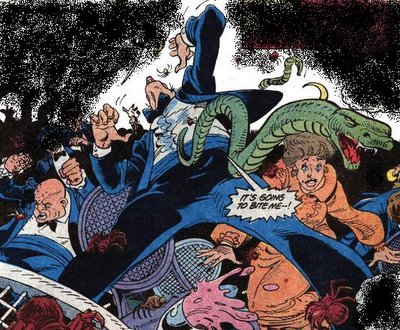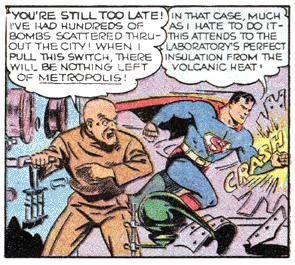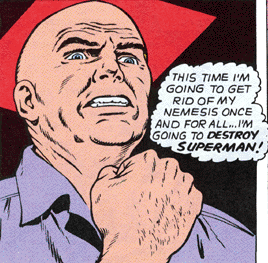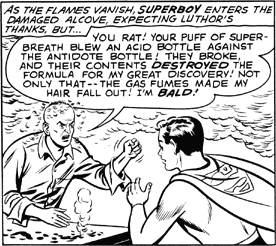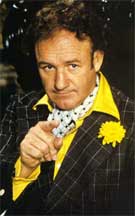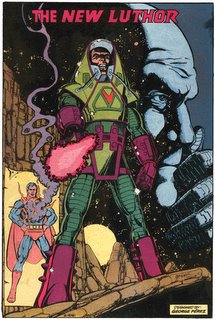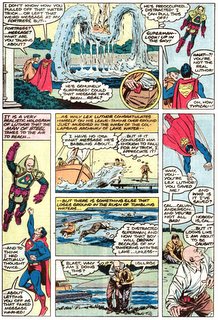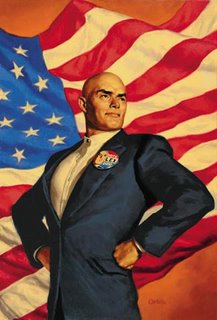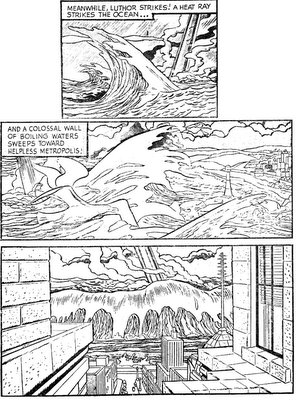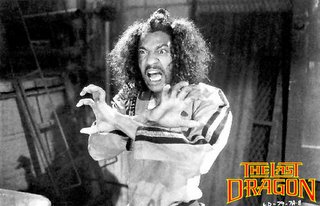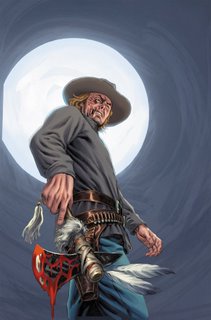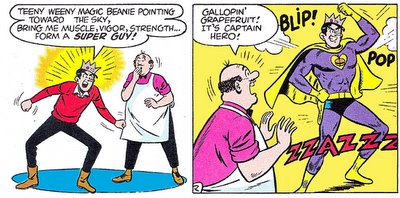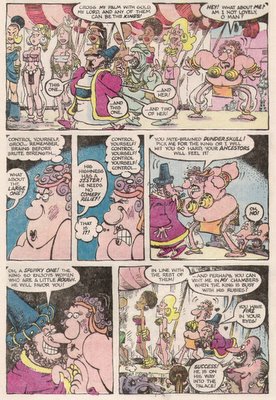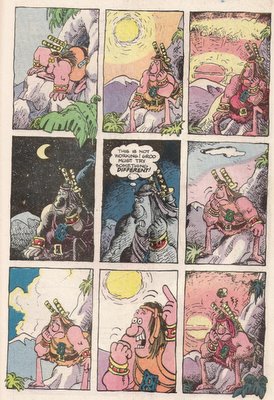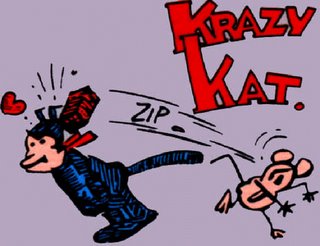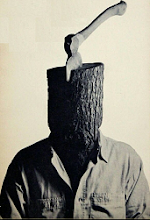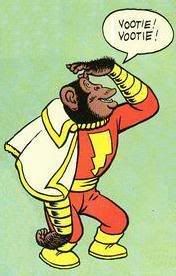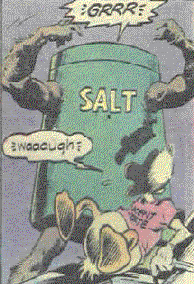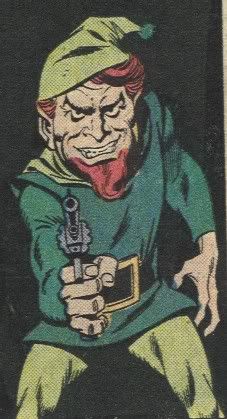Ah, to hell with it. One big fat political salvo. Then “Grump Week” ends, because being grumpy is boring.
I apologize for getting topical. Back to frivolities after this.
--------------------------
You know what really grinds my gears?
Silence. Silence of a peculiar sort.
Listen close.
The Bush Administration arrests people without charge as “enemy combatants” and holds them for years without benefit of legal counsel. It spies on American citizens without warrants, insist that it should be able to torture if it wants to, and has set up secret prisons in Eastern Europe, likely for that very purpose.
When called to account for any of these issues, the Administration has said:
“Hey, we’re fighting a war here. The President can do whatever he deems necessary to Protect the American People (tm, pat. pending). An undeclared war. Against an undefined enemy. Against a method, really. A war that can never be declared ‘won,’ because, guess what, terrorism never dies.”
Ah.
“Trust us,” the White House says. “We’re only doing this because we’re facing a grave threat. We’ll get back to normal when the war is over.”

When will that be?
“When we say it’s over.”
Ah.
Under this line of thought, under what constraints does the President operate?
Think hard.
The answer is “none.” According to this type of thinking, the President's status as Commander in Chief means that any actions taken to defend America are his right. He will Do What He Must to Protect the American People, and pansy laws and structures of the republic be damned!
That the President and his cronies have declared themselves above the rule of law is hardly surprising.
...that so many people are silent in the face of this gall,
that is a surprise.
The laws and checks placed on the President are there not for the safety of murderers and thieves. They are not the product of weak men seeking to “coddle criminals” or fools who "don't understand how the world works." They are the fruits of centuries of hard lessons about law, justice, and government.
The play
A Man for All Seasons portrayed the conflict between King Henry VIII and his chancellor, Sir Thomas More, a man of unbending principle. Early in the play, More’s future son-in-law railed against More’s unwillingness to imprison a man who was foul but had broken no laws. More insisted on the primacy of law, even in the face of evil.
William Roper: So, now you give the Devil the benefit of law!
Sir Thomas More: Yes! What would you do? Cut a great road through the law to get after the Devil?
William Roper: Yes, I'd cut down every law in England to do that!
Sir Thomas More: Oh? And when the last law was down, and the Devil turned 'round on you, where would you hide, Roper, the laws all being flat? This country is planted thick with laws, from coast to coast, Man's laws, not God's! And if you cut them down, and you're just the man to do it, do you really think you could stand upright in the winds that would blow then? Yes, I'd give the Devil benefit of law, for my own safety's sake!
To stand by and do nothing while the President declares himself above any law is to remove our protection against tyranny. Where would we stand when the winds blew then?
Let's be honest. Many people, deep down, crave an enlightened despot, a powerful and wise figure who would remove the burdens of leadership from us and take us into a better future. Democracy is hard, frustrating work riddled with mistakes and the awful weight of responsibility.
But what if the despot makes a mistake? What if the despot grows impatient and decides that “to make an omelette means breaking a few eggs?”
Then, my fellow Americans, we are all screwed.
I live in Arlington, Virginia, a stone’s throw from the District. Since I moved here, I’ve been around for some crazy shit. You may have heard about some of it.
A father-and-son sniper team terrorized my town. They shot one of their victims in the parking lot of a hardware store where I shop regularly.
Mail delivery to my house was a little slow for a while, since weaponized anthrax was making its way around the DC postal system.
And a giant fucking airplane seized by murderous zealots smashed into an office building near my house, killing one hundred and eighty-nine people, including one of my coworkers.
Do you know what burnt jet fuel and powdered cement smells like? I do.
Every day, I ride the DC Metro train system to work. It’s one hell of a bomb magnet. I work a block from the White House, the biggest target on the face of the Earth.
If anyone would benefit from the Bush Administration’s authoritarian tactics, it would be me. My personal safety benefits from them, plus, hey, since my job is intimately tied into the national security apparatus, it means job security too.
And right here and now, I say that Bush should be impeached for breaking the law.
I will not surrender the rule of law out of fear. I will not surrender my children’s futures because I am terrified of some fuckwit with a barrel of homemade explosive and a rental truck.
Fuck al-Qaeda. Fuck Osama bin Laden. Fuck the snipers. Fuck the anthrax-mailing asshole, whoever he is.
But they’re not everyone on my fuck-off list.
Fuck the fearmongering paranoid clowns who used the attacks on September 11th as a pretext to snatch more power for themselves and do what they always wanted to do. Fuck the pandering sycophantic tools who shirked their duties and let the paranoid clowns do what they want.
And most of all, fuck the knee-jerk badge-kisser “patriots” who will let a man in power do anything,
as long as it’s forceful. These folks
love the use of force. Nothing gives them a bigger charge than seeing an authority figure slap someone down.
These pseudo-patriots are the enemies of freedom, and they don’t even know it. Claiming they love their country, they’ll obliterate every ounce of freedom and say it’s for the public good. They’ll smile, wave a flag, and crush the ideals of the republic in the name of saving it.
They don’t understand that professing high ideals doesn’t mean anything if you’re not willing to follow through on them. That actions count, not beliefs. That an authority figure can stand before a crowd, smile, and with the best of intentions, do a horrible thing. They refuse to see.
“Sure, the President flouted the law, but he did it for a good reason. He’s a good man, and I believe in him.”
Silly me, judging a man by what he does, not his demeanor. He has declared himself above the law. He has broken the law. And he must face the consequences of it.
If you don’t understand what I’m talking about, if you think I’m some sort of treasonous toad who “wants the terrorists to win” or “doesn’t understand what kind of war this is,” ask yourself this: what action could Bush take that would make you think he’s finally overstepped his bounds in the “Global War on Terror” and should be brought to heel?
If you can’t answer that without resorting to cartoon fantasies of jackboots and assassinations, you need to crack open a civics or history textbook and maybe even read the occasional newspaper. Real corruption eases its way in, bit by bit. Eased by regular citizens who don’t pay attention or think that history doesn’t apply to them.
“This time it’s different, because we would never do that. We’re different…we’re
Americans!”
No. We’re
people, the same as everybody else. What makes our system worth anything is that it was built around that very simple idea, an idea formed by centuries of hard-won wisdom and suffering: People are people, unfettered power will lead to corruption, and that the only way to ensure freedom is to split power among many competing hands.
Bush is consolidating power, claiming prerogatives that do not belong to him, in violation of the controls long established. Do his defenders believe these old understandings are now wrong? Has humanity changed so dramatically in the last two centuries, that the wisdom of the past no longer holds true?
Or is it that perhaps the difficulty of relating the past to the present that blinds us to the idea? The lessons of history are tough to apply; what seems clear in retrospect is often hard to see in the chaos of everyday life.
Here’s the simple truth: the great danger to our freedom is not terrorism. It’s not Islamist dipshits with truck bombs or airliners.
The great danger is our willingness to abandon everything for which our forefathers fought and died in return for a little quiet. The great danger is our hope that if we sit down, shut up, and don’t make waves, Big Daddy will protect us and stop the bad men.
The great danger is our own fear.

And what horrible mistakes our fear might lead us to make.
Abraham Lincoln, a President who faced a greater threat to the republic than any man before or since, put it best:
"America will never be destroyed from the outside. If we falter and lose our freedoms, it will be because we destroyed ourselves."
And that, my brothers and sisters, is the simple truth.
Click here to read more!
